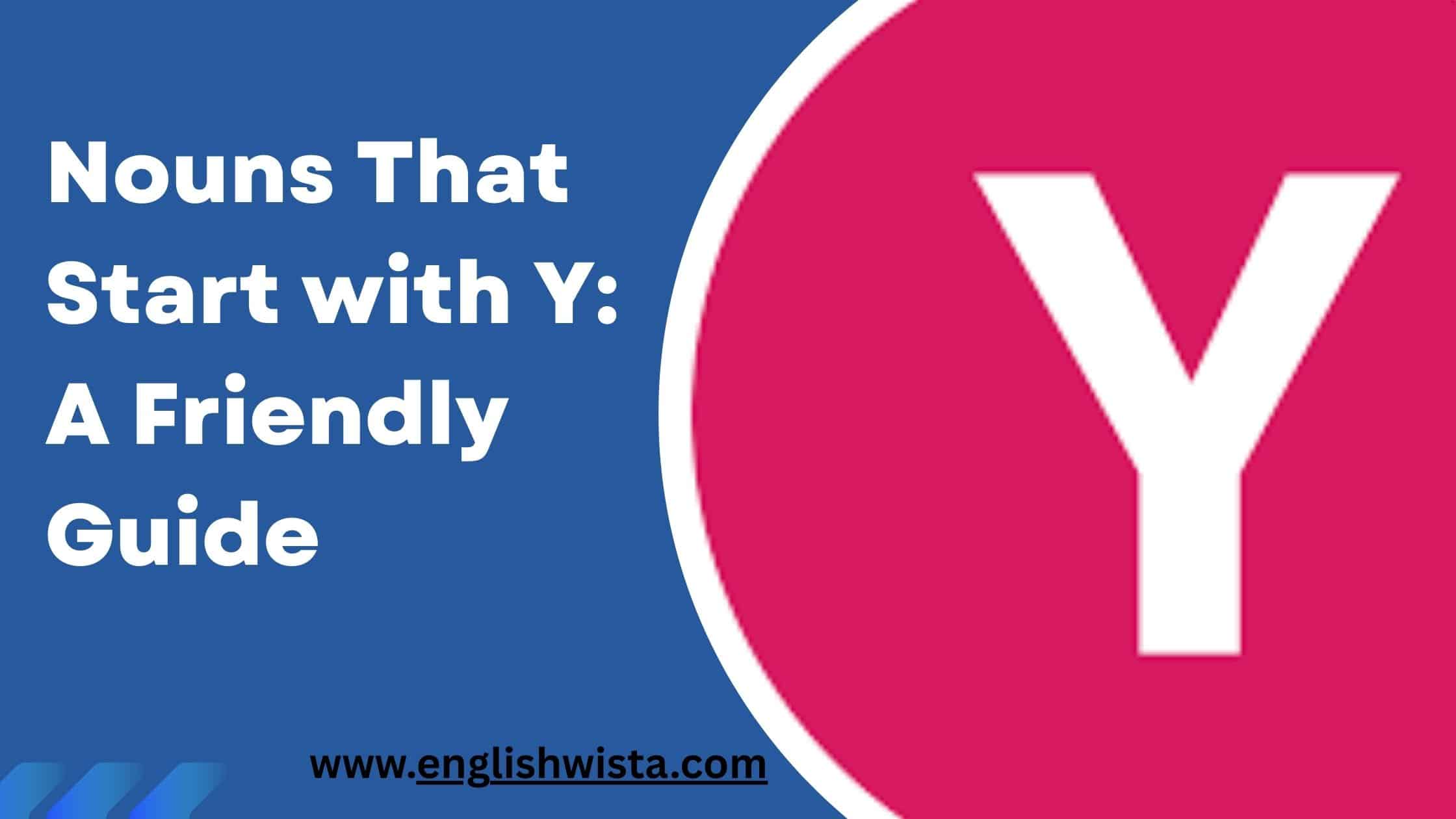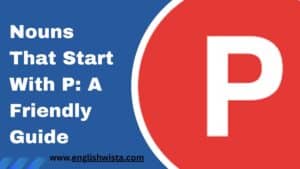Why Focus on Nouns with Y?
Have you ever noticed how some letters in English don’t get as much attention as others? Take the letter Y, for example. It’s not as common as S or T when it comes to starting words. But when Y does show up, it gives us some truly unique and useful nouns.
In this article, we’re going to explore nouns that begin with Y. Don’t worry if you’re new to English grammar or if English isn’t your first language. I’ll keep everything simple, friendly, and easy to understand. We’ll go step by step, look at clear examples, and even sprinkle in some fun facts along the way. By the end, you’ll feel confident about using these “Y” nouns in your own conversations and writing.
Let’s dive in!
What Are Nouns, Again?
Before we focus on Y nouns, let’s quickly remind ourselves what nouns are.
- A noun is a word that names a person, place, thing, or idea.
- For example: dog, school, happiness, teacher.
Nouns help us talk about the world around us. Without them, we’d have a hard time naming or identifying anything.
Now that we’re clear about nouns, let’s zoom in on the ones that start with Y.
Why Are Nouns Starting with Y Special?
The letter Y is special because it isn’t used very often at the beginning of words. This makes Y nouns feel a little more rare or unique. Some of them come from old languages, some are modern inventions, and others describe very specific things.
Because there aren’t as many Y nouns as, say, S nouns, each one tends to stand out more. Think about words like youth, yard, yogurt, or year these are simple but important parts of our daily vocabulary.
Common Nouns That Start with Y
Let’s look at some of the most common and useful Y nouns.
- Yard – an outdoor area around a house.
- Year – 12 months or 365 days.
- Youth – the time of life when someone is young.
- Yarn – thread used for knitting or weaving.
- Yogurt – a food made from milk and bacteria cultures.
- Yak – a type of long-haired animal found in Asia.
- Yawn – the act of opening your mouth wide when you’re tired.
- Yellow – the color between green and orange.
- Yacht – a type of boat used for pleasure or sport.
- Yolk – the yellow part inside an egg.
These nouns may seem simple, but they’re quite powerful in everyday use.
What Is the Plural of Y Nouns?
Great question! The plural of nouns starting with Y follows the same rules as other nouns.
- If the word ends in a regular letter, just add -s.
- yard → yards
- year → years
- If the word ends in -y and comes after a consonant, change the y to i and add -es.
- yarn → yarns (no change because “rn” is not a consonant + y ending)
- yummy → yummies (adjective turned noun, but same rule)
- Some words have irregular plurals.
- youth → youths (commonly used)
- yak → yaks
So, the rule is pretty simple, but always check for exceptions.
Examples of Y Nouns in Sentences
The best way to understand these nouns is to see them in action.
- The children played in the yard until sunset.
- This year has been full of new opportunities.
- During his youth, he traveled across Europe.
- She bought colorful yarn for knitting a sweater.
- I eat yogurt every morning for breakfast.
- The farmer owns a yak that helps carry loads.
- He let out a big yawn during the meeting.
- The walls were painted bright yellow.
- They sailed on a luxury yacht in the Mediterranean.
- The egg yolk contains many nutrients.
By reading and practicing with examples like these, you’ll remember the words more easily.
Where Do Some Y Nouns Come From?
English is like a big collection of borrowed words. Many Y nouns come from other languages.
- Yogurt comes from Turkish.
- Yak comes from the Tibetan language.
- Yacht comes from Dutch.
- Yen (Japanese money) comes directly from Japanese.
- Yoga (sometimes used as a noun) comes from Sanskrit.
Isn’t it interesting how English has gathered words from all over the world? That’s why Y nouns can feel a bit exotic or unusual.
Are Y Nouns Countable or Uncountable?
Another question learners often have is: Are these nouns countable or uncountable?
- Countable nouns can be counted: one yard, two yards, three yards.
- Uncountable nouns cannot be counted directly: yogurt, youth, yarn (sometimes treated as uncountable).
Examples:
- He has two yards of land. (countable)
- I bought three cups of yogurt. (uncountable by itself, but measured in cups)
- Her youth was spent in the countryside. (uncountable)
Knowing whether a noun is countable or not helps you use the right articles and quantities.
Fun and Unusual Y Nouns
Here are some extra nouns you may not hear every day, but they’re still fun to know:
- Yeti – a mythical creature said to live in the Himalayas.
- Yew – a type of tree with dark green leaves.
- Yawnfest – a slang word for something boring.
- Yen – a strong desire, or the currency of Japan.
- Yahoo – originally a rude or loud person; also the name of a famous internet company.
These words show how diverse Y nouns can be from trees to legends to slang expressions!
Everyday Uses of Y Nouns
Let’s connect Y nouns to daily life:
- In the kitchen: yogurt, yolk.
- In the garden: yard, yew tree.
- In school or work: year, youth.
- In travel: yacht, yak, yen.
- In casual talk: yawn, yahoo, yawnfest.
As you can see, Y nouns may not be many, but they pop up in many different areas of life.
Quick Tips for Learning Y Nouns
Here are some easy ways to remember and practice them:
- Group them by theme. For example, food (yogurt, yolk, yam), nature (yak, yard, yew), time (year, youth).
- Make short sentences. “This year I want to eat more yogurt.”
- Use flashcards. Write the word on one side and a picture on the other.
- Practice with friends. Try to use three Y nouns in a conversation.
Repetition in different contexts will make them stick in your memory.
Fun Facts About Y
- The letter Y can act as both a consonant (yard) and a vowel (yolk).
- In Old English, the word for “year” was gear. The Y version came later.
- “Yawn” is contagious just reading the word might make you yawn!
- Some old-style signs used Y in place of “th.” For example, “Ye Olde Shoppe” actually means “The Old Shop.”
Conclusion: Why Y Nouns Matter
We’ve taken a long, friendly journey through nouns starting with Y. Even though they aren’t as common as nouns starting with other letters, they’re still important. From yard to year, from yogurt to yak, these words help us describe everyday things, places, and even fun myths.
Here are the key takeaways:
- Nouns name people, places, things, or ideas.
- Y nouns are less common but very useful.
- Some are countable (yards, years), and some are uncountable (yogurt, youth).
- Many Y nouns come from other languages, showing English’s global mix.
- Practice using them in sentences to build confidence.
So next time you spot a word starting with Y, smile and remember you’re looking at one of the unique little gems of the English language.



